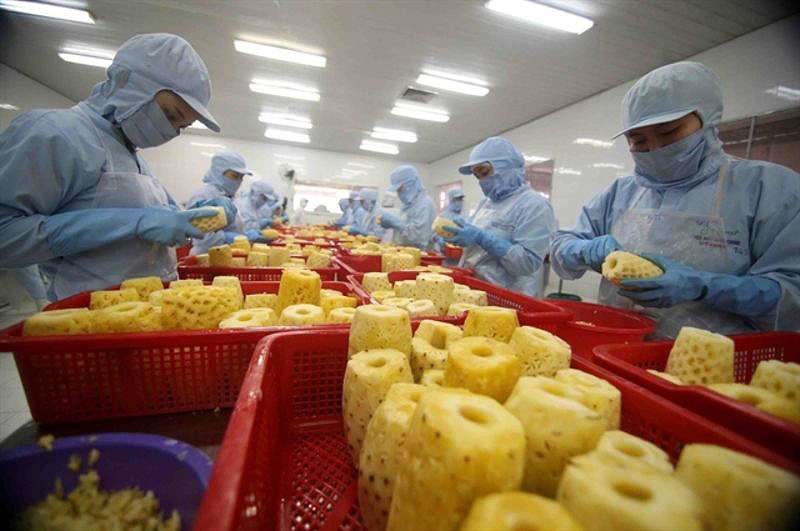
Canned pineapple products for export are seen at the An Giang Agriculture and Foods Import-Export JSC.
December 5, 2021
Processed fruits and vegetables will continue to enjoy strong growth potential thanks to their convenience and long preservation time, the Vietnam Industry and Trade Information Centre has forecast.
Between 2016 and 2020, Vietnam’s processed fruit and vegetable exports grew by double digits annually. In 2019, exports surged by 41.2% year-on-year, before slowing to a still respectable 11.1% in 2020.
Amid the prolonged COVID-19 pandemic, processed fruit and vegetable exports earned $653.5 million over the past nine months, up 16% year-on-year.
The key export markets for Vietnamese processed fruit and vegetables are China, Japan, South Korea, Australia, Russia and the United States. Vietnam’s exports to China grew by 24.8% over the same period in 2020.
The center forecasts that the COVID-19 pandemic will not negatively affect the global processed fruit and vegetable industry. On the contrary, the supply of processed fruit and vegetables has increased, while the export of fresh or frozen products has fallen, causing a shift among producers.
General Secretary of the Vietnam Fruit and Vegetable Association Dang Phuc Nguyen agreed. He told Viet Nam News that the country’s exports of processed fruits and vegetables have performed positively in the past two years, despite the pandemic.
Nguyen explained that the pandemic has broken transport supply chains, making shipping costs higher due to the limited number of operational ships and aircraft. At the same time, a major maritime incident in the Suez Canal — the gateway for the movement of goods between Europe and Asia — has extended the shipping time of fresh fruits and vegetables.
“The longer shipping process can make fresh fruits and vegetables damaged,” Nguyen told Viet Nam News, adding that in this context, fresh fruits and vegetables that cannot be exported will be provided to local processing factories.
This abundant source of raw materials at cheaper prices has helped processing factories to speed up their production capacities for exports, Nguyen said.
He added that shelf life and e-commerce are responsible for promoting the consumption of processed fruit and vegetables in imported countries where transportation has also encountered difficulties due to social distancing measures.
Thanks to surging demand and the efforts of local processing factories to expand their production, processed fruits and vegetables currently account for 25-30% of the total national export turnover of fruits and vegetables, compared to 10% in the pre-pandemic period, Nguyen said.
However, the fruit and vegetable processing industry continues to face many shortcomings and limitations.
One issue is Vietnamese products are currently exported under different brand names, which Nguyen attributes to a lack of strong brands at a national level, as well as an insufficient understanding of the tastes of customers and a failure to establish supply chains in overseas markets.
The processing industry only meets 8-10% of the annual fruit and vegetable output. Consumption is still in the form of fresh or preliminary preservation, with post-harvest losses remaining too high at approximately 20%. Thus, there remains room for Vietnamese enterprises to invest in developing processing technology and promoting exports when consumer demand in the world market increases, the Ministry of Industry and Trade said.
Top Articles in World
-

Israeli Ambassador to Japan Speaks about Japan’s Role in the Reconstruction of Gaza
-

Videos Plagiarized, Reposted with False Subtitles Claiming ‘Ryukyu Belongs to China’; Anti-China False Information Also Posted in Japan
-

North Korea Possibly Launches Ballistic Missile
-

Chinese Embassy in Japan Reiterates Call for Chinese People to Refrain from Traveling to Japan; Call Comes in Wake of ¥400 Mil. Robbery
-

Russia: Visa Required for Visiting Graves in Northern Territories, Lifting of Sanctions Also Necessary
JN ACCESS RANKING
-

Japan PM Takaichi’s Cabinet Resigns en Masse
-

Japan Institute to Use Domestic Commercial Optical Lattice Clock to Set Japan Standard Time
-

Israeli Ambassador to Japan Speaks about Japan’s Role in the Reconstruction of Gaza
-

Man Infected with Measles Reportedly Dined at Restaurant in Tokyo Station
-

Videos Plagiarized, Reposted with False Subtitles Claiming ‘Ryukyu Belongs to China’; Anti-China False Information Also Posted in Japan






















